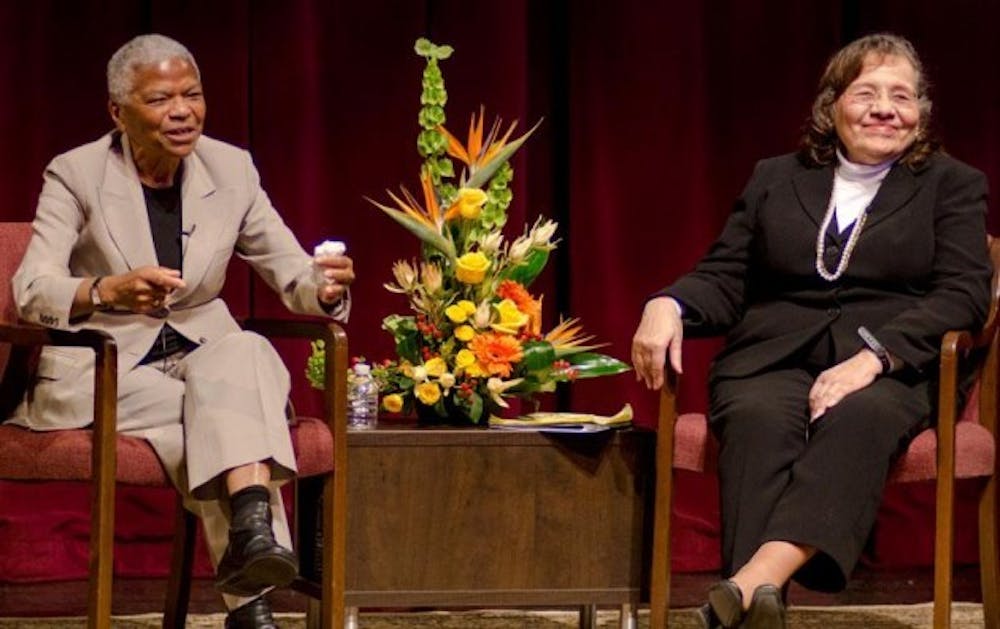Mary Frances Berry and Diane Nash embody the words of their friend Martin Luther King Jr.: "True compassion is more than flipping a coin to a beggar. It comes to see that an edifice which produces beggars needs restructuring."
On Wednesday night, a crowd of about 1,000 people filed into the Center For the Arts to see Berry and Nash speak in the fourth installment of this year's Distinguished Speakers Series and the 34th annual Martin Luther King Jr. Commemoration Event.
Berry and Nash were instrumental figures in the Civil Rights Movement and were even imprisoned for their activities - Nash was in jail for 30 days while pregnant with her first child.
This year also marks the 50th anniversary of the Civil Rights Act of 1964 - legislation to which Berry and Nash dedicated themselves.
They spent Wednesday evening stressing the idea that people have the power to impart major changes in society - much more so than government officials.
"If we had waited for elected officials to desegregate lunch counters in restaurants and public facilities, desegregate interstate bus travel, to get the right to vote for blacks ... we would still be waiting now," Nash said during her speech. "Citizens of this country have to take the future of the country into our own hands."
President John F. Kennedy appointed Nash to a national committee that promoted the passage of the Civil Rights Act of 1964. President Jimmy Carter hired Berry as commissioner of the U.S. Commission on Civil Rights in 1977. President Bill Clinton appointed her chair of the Civil Rights Commission in 1993.
Nash and Berry knew King very well. Nash and her husband at the time even went on a "double date" to the Bahamas with him.
Each woman's journey toward becoming a civil rights activist began in Nashville, Tenn.
Nash, who is from Southside Chicago, Ill., attended Fisk University in Nashville, and there she saw firsthand the injustice in segregation. She saw African-Americans sitting outside on the curb, eating their meals there because they were not allowed at the lunch counters. She found it humiliating and degrading because she was conforming to the unjust system.
For Berry, who is from Nashville, the turning point in her mind was the Supreme Court ruling of Brown vs. Board of Education (1954) - which ruled segregation in public schools unconstitutional.
Berry said the ruling, although it was a step in the right direction, showed that legislation and government aren't going to change social thinking. She said the Civil Rights Movement was a direct cause of the Supreme Court ruling.
"The movement, when it happened ... was a natural outgrowth of the failure of the country to come to grips with [Brown vs. Board of Education] and to actually do anything in implementing its provisions in a broad-brush way," Berry said in her speech.
Nash and Berry emphasized that mobilizing people and bringing attention to social inequality is the key to change.
"One of the lessons that I think we can learn from the '60s is that it's a huge mistake to depend on elected officials to do what's necessary in the interest of the country," Nash said in an interview with The Spectrum. "And that's one of the things that really troubles me now, is that American citizens seem to think that the 10 minutes they spend in the voting booth every two years is enough. And then they expect elected officials to do what's necessary."
At Fisk University, the injustice Nash saw motivated her to effect change. Using Gandhi's methods of non-violence, Nash planned sit-ins in an effort to desegregate lunch counters in Nashville. Eventually, Nashville became the first southern city to desegregate lunch counters.
She said some of the blame for segregation belongs to those being segregated. In her experience, there was a driving principle that is inherently true: "Oppression always requires the cooperation of the oppressed. It is something that the oppressed and the oppressor do together."
She explained further, saying conforming to a flawed system only perpetuates it.
"The day the blacks in Montgomery decided there would no longer be segregated buses in Montgomery, it took no change on the part of whites," Nash said in her speech. "The day the blacks in Montgomery decided there would no longer be segregated buses in Montgomery, there were no longer segregated buses in Montgomery."
Nash learned early on that change starts at a personal level and then branches outward.
"The only person you can change is yourself," Nash told the audience. "When you change yourself, the world has to fit up against the new you. We changed ourselves in the South into people who could not be segregated."
Berry stressed that there is still a lot left to do to achieve social justice. She said, as a society, we tend to "move from one issue to another before the work is done."
She encouraged students to get involved in causes they feel are important.
"It's never going to be over; life is too dynamic," Berry told The Spectrum.
email: news@ubspectrum.com





